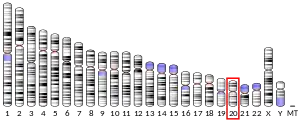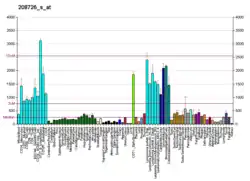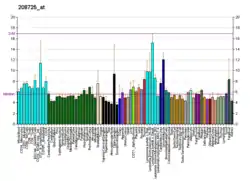EIF2S2
Eukaryotic translation initiation factor 2 subunit 2 (eIF2β) is a protein that in humans is encoded by the EIF2S2 gene.[5][6]
Function
Eukaryotic translation initiation factor 2 (eIF2) functions in the early steps of protein synthesis by forming a ternary complex with GTP and initiator tRNA and binding to a 40S ribosomal subunit. eIF2 is composed of three subunits, alpha (α), beta (β, this article), and gamma (γ), with the protein encoded by this gene representing the beta subunit. The beta subunit catalyzes the exchange of GDP for GTP, which recycles the eIF2 complex for another round of initiation.[6]
Regulation
Both eIF2α and eIF2β expression is regulated by the NRF1 transcription factor.[7]
See also
References
- GRCh38: Ensembl release 89: ENSG00000125977 - Ensembl, May 2017
- GRCm38: Ensembl release 89: ENSMUSG00000074656 - Ensembl, May 2017
- "Human PubMed Reference:". National Center for Biotechnology Information, U.S. National Library of Medicine.
- "Mouse PubMed Reference:". National Center for Biotechnology Information, U.S. National Library of Medicine.
- Pathak VK, Nielsen PJ, Trachsel H, Hershey JW (Sep 1988). "Structure of the beta subunit of translational initiation factor eIF-2". Cell. 54 (5): 633–9. doi:10.1016/S0092-8674(88)80007-2. PMID 3044606. S2CID 54414457.
- "Entrez Gene: EIF2S2 eukaryotic translation initiation factor 2, subunit 2 beta, 38kDa".
- Chiorini JA, Miyamoto S, Harkin SJ, Safer B (February 1999). "Genomic cloning and characterization of the human eukaryotic initiation factor-2beta promoter". J. Biol. Chem. 274 (7): 4195–201. doi:10.1074/jbc.274.7.4195. PMID 9933616.
Further reading
- Welsh GI, Price NT, Bladergroen BA, et al. (1994). "Identification of novel phosphorylation sites in the beta-subunit of translation initiation factor eIF-2". Biochem. Biophys. Res. Commun. 201 (3): 1279–88. doi:10.1006/bbrc.1994.1843. PMID 8024572.
- Brand SR, Kobayashi R, Mathews MB (1997). "The Tat protein of human immunodeficiency virus type 1 is a substrate and inhibitor of the interferon-induced, virally activated protein kinase, PKR". J. Biol. Chem. 272 (13): 8388–95. doi:10.1074/jbc.272.13.8388. PMID 9079663.
- Das S, Maiti T, Das K, Maitra U (1998). "Specific interaction of eukaryotic translation initiation factor 5 (eIF5) with the beta-subunit of eIF2". J. Biol. Chem. 272 (50): 31712–8. doi:10.1074/jbc.272.50.31712. PMID 9395514.
- Ting NS, Kao PN, Chan DW, et al. (1998). "DNA-dependent protein kinase interacts with antigen receptor response element binding proteins NF90 and NF45". J. Biol. Chem. 273 (4): 2136–45. doi:10.1074/jbc.273.4.2136. PMID 9442054.
- Kimball SR, Heinzinger NK, Horetsky RL, Jefferson LS (1998). "Identification of interprotein interactions between the subunits of eukaryotic initiation factors eIF2 and eIF2B". J. Biol. Chem. 273 (5): 3039–44. doi:10.1074/jbc.273.5.3039. PMID 9446619.
- Chiorini JA, Miyamoto S, Harkin SJ, Safer B (1999). "Genomic cloning and characterization of the human eukaryotic initiation factor-2beta promoter". J. Biol. Chem. 274 (7): 4195–201. doi:10.1074/jbc.274.7.4195. PMID 9933616.
- Cai R, Carpick B, Chun RF, et al. (2000). "HIV-I TAT inhibits PKR activity by both RNA-dependent and RNA-independent mechanisms". Arch. Biochem. Biophys. 373 (2): 361–7. doi:10.1006/abbi.1999.1583. PMID 10620360.
- Ben-Asouli Y, Banai Y, Hauser H, Kaempfer R (2000). "Recognition of 5′-terminal TAR structure in human immunodeficiency virus-1 mRNA by eukaryotic translation initiation factor 2". Nucleic Acids Res. 28 (4): 1011–8. doi:10.1093/nar/28.4.1011. PMC 102579. PMID 10648795.
- Das S, Maitra U (2000). "Mutational Analysis of Mammalian Translation Initiation Factor 5 (eIF5): Role of Interaction between the β Subunit of eIF2 and eIF5 in eIF5 Function In Vitro and In Vivo". Mol. Cell. Biol. 20 (11): 3942–50. doi:10.1128/MCB.20.11.3942-3950.2000. PMC 85746. PMID 10805737.
- Gomez E, Pavitt GD (2000). "Identification of Domains and Residues within the ɛ Subunit of Eukaryotic Translation Initiation Factor 2B (eIF2Bɛ) Required for Guanine Nucleotide Exchange Reveals a Novel Activation Function Promoted by eIF2B Complex Formation". Mol. Cell. Biol. 20 (11): 3965–76. doi:10.1128/MCB.20.11.3965-3976.2000. PMC 85753. PMID 10805739.
- Das S, Ghosh R, Maitra U (2001). "Eukaryotic translation initiation factor 5 functions as a GTPase-activating protein". J. Biol. Chem. 276 (9): 6720–6. doi:10.1074/jbc.M008863200. PMID 11092890.
- Reichman TW, Muñiz LC, Mathews MB (2002). "The RNA Binding Protein Nuclear Factor 90 Functions as Both a Positive and Negative Regulator of Gene Expression in Mammalian Cells". Mol. Cell. Biol. 22 (1): 343–56. doi:10.1128/MCB.22.1.343-356.2002. PMC 134226. PMID 11739746.
- Deloukas P, Matthews LH, Ashurst J, et al. (2002). "The DNA sequence and comparative analysis of human chromosome 20". Nature. 414 (6866): 865–71. doi:10.1038/414865a. PMID 11780052.
- Kebache S, Zuo D, Chevet E, Larose L (2002). "Modulation of protein translation by Nck-1". Proc. Natl. Acad. Sci. U.S.A. 99 (8): 5406–11. doi:10.1073/pnas.082483399. PMC 122782. PMID 11959995.
- Strausberg RL, Feingold EA, Grouse LH, et al. (2003). "Generation and initial analysis of more than 15,000 full-length human and mouse cDNA sequences". Proc. Natl. Acad. Sci. U.S.A. 99 (26): 16899–903. doi:10.1073/pnas.242603899. PMC 139241. PMID 12477932.
- Llorens F, Roher N, Miró FA, et al. (2004). "Eukaryotic translation-initiation factor eIF2beta binds to protein kinase CK2: effects on CK2alpha activity". Biochem. J. 375 (Pt 3): 623–31. doi:10.1042/BJ20030915. PMC 1223719. PMID 12901717.
- Gerhard DS, Wagner L, Feingold EA, et al. (2004). "The Status, Quality, and Expansion of the NIH Full-Length cDNA Project: The Mammalian Gene Collection (MGC)". Genome Res. 14 (10B): 2121–7. doi:10.1101/gr.2596504. PMC 528928. PMID 15489334.
- Andersen JS, Lam YW, Leung AK, et al. (2005). "Nucleolar proteome dynamics". Nature. 433 (7021): 77–83. doi:10.1038/nature03207. PMID 15635413. S2CID 4344740.
- Stelzl U, Worm U, Lalowski M, et al. (2005). "A human protein-protein interaction network: a resource for annotating the proteome". Cell. 122 (6): 957–68. doi:10.1016/j.cell.2005.08.029. hdl:11858/00-001M-0000-0010-8592-0. PMID 16169070. S2CID 8235923.
This article is issued from Wikipedia. The text is licensed under Creative Commons - Attribution - Sharealike. Additional terms may apply for the media files.






